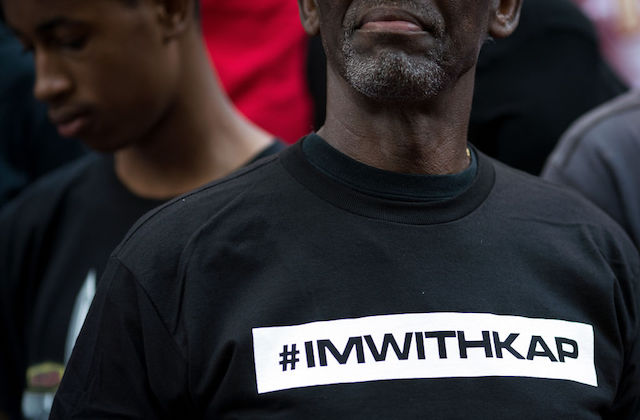Amid Player Protests, NFL Agrees to Back Criminal Justice Reform

The National Football League (NFL), which has wavered in its support of national anthem protests, announced late Monday (October 16) that it endorses a bipartisan criminal justice bill that would reduce sentences for some nonviolent crimes and eliminate “three strike” mandatory life sentences for repeat drug offenders.
NFL spokesperson Joe Lockhart addressed the measure yesterday in a conference call with reporters, according to The Washington Post: “We felt that this was an issue over the last months, as we have continued to work with our players on issues of equality and on issues of criminal justice reform, that was surfaced for us, and we thought it was appropriate to lend our support to it.”
Many NFL team owners found themselves locking arms with players as an act of solidarity against President Donald Trump’s attack on the league. But they have failed to address the social injustice that spurred those protests, and several of them have voiced displeasure with players who kneel. The team owners—some of whom are big donors to President Donald Trump—are mostly White, conservative billionaires who stood silent when Colin Kaepernick launched the anthem protests more than a year ago. And now multiple reports say that they are considering an NFL rule that would mandate standing for the national anthem.
The proposed rule and support for the criminal justice bill are expected to come up today during a meeting of NFL team owners, who have come under fire from President Donald Trump for not penalizing players who protest. Trump, furthermore, recently tweeted that tax laws should be used to punish the NFL for the protests.
NFL Commissioner Roger Goodell initially defended players. According to CNN, in a recent memo to NFL executives, he said, “We also care deeply about our players and respect their opinions and concerns about critical social issues.” But in the same memo, Goodell stated that the NFL wants all players to stand for the national anthem.
Per CBS Sports, Goodell has been in dialogue with current and former players since the summer, and is working with them to devise ways the NFL can participate in social justice issues, including PSA campaigns and a social activism camp at historically Black Morehouse College in Atlanta.
The Post reports that spokespeople for Senators Charles Grassley (R-Iowa) and Richard Durbin (D-Ill.), the main sponsors of the Sentencing Reform and Corrections Act, did not comment about the timing of the NFL’s endorsement, nor did they say if the support is an effort to overcome the debate surrounding player protests. They did say that they did not coordinate with the league ahead of the endorsement announcement.
The measure, which revives a five-year, bi-partisan effort to revamp the criminal justice system, would ease sentences for nonviolent offenses like drug crimes while tightening penalties for violent criminals. According to Durbin in a statement about the bill:
This compromise represents more than five years of work on criminal justice reform. The United States incarcerates more of its citizens than any other country on earth. Mandatory minimum sentences were once seen as a strong deterrent. In reality they have too often been unfair, fiscally irresponsible and a threat to public safety.
Mandatory minimums and nonviolent offenses have been most unfair to Blacks and Latinxs, studies show. In some states, incarceration rates for Black Americans are 10 times the rate of incarceration for Whites, according to a recent report from The Sentencing Project. And according to Human Rights Watch, Blacks are more than four times as likely to be arrested for marijuana possession offenses, although cannabis usage rates are similar among Whites, Blacks and Latinxs.
Introduced in the Senate in early October, the bill enjoys support among “Right on Crime” Republicans like Mike Lee of Utah and Jeff Flake of Arizona. But it’s likely to face fierce opposition from President Trump and Attorney General Jeff Sessions, who in May ordered federal prosecutors to seek the toughest possible charges against crime suspects, and who helped derail the bill when he was in the Senate.
